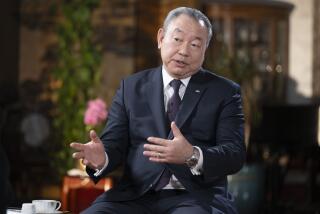Beijing Needs to Relax About Taiwan : Why Washington is absolutely right to allow visit of President Lee Teng-hui
- Share via
The Clinton Administration’s decision to let Taiwanese President Lee Teng-hui visit the United States for a college reunion was based more on domestic politics than international concerns. This time, good politics is also good policy.
Beijing is angry at the planned June visit, taking the huffy official view that Lee is the president of a renegade province. But he will travel to Cornell University as a private citizen, not on a state visit. A State Department spokesman said Americans “treasure the rights of freedom of speech and freedom of travel and believe others should enjoy these privileges as well.”
Washington has had only unofficial ties with Taiwan since 1979, when it recognized Beijing as the capital of “one China” after three decades of hostility. But in recent years Beijing has been upset at the United States over actions including the Bush Administration’s sale of F-16 fighter jets to Taiwan and the Clinton Administration’s permission for U.S. Cabinet officials to visit Taipei.
Beijing would do well to recall the Clinton Administration’s willingness last year to uncouple human rights and trade. That opened the way for renewal of China’s most-favored-nation trade status, despite the brutal repression that followed the 1989 Tian An Men Square demonstrations for democracy. Washington also had to wrestle China to the mat this year over piracy of compact disks and laser videodiscs, often in government-owned factories.
En route to Central America last year, Lee was not allowed to stop in Honolulu overnight. He was also refused permission to enter the United States for the 1994 Cornell reunion. Both decisions were outrages. But this month, the House voted 396-0 and the Senate 97-1 for resolutions urging the White House to let Lee visit.
A State Department spokesman said Washington credits Lee with promoting democracy in Taiwan, which, like China, is a major U.S. trading partner. The spokesman also said the visit does not represent a change in U.S. policy. The House and Senate votes, and the Administration’s heeding of the changed makeup of Congress, should be a reminder to China of how a democracy works.
More to Read
Sign up for Essential California
The most important California stories and recommendations in your inbox every morning.
You may occasionally receive promotional content from the Los Angeles Times.













